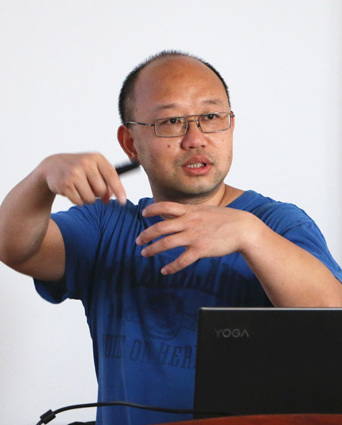
搜索网站、位置和人员

新闻与活动 活动信息
Physics Colloquium | Lan Wang: Protonic gated 2D Materials and van der Waals heterostructures
时间
2021年06月22日(周二)
14:00-15:30
地点
西湖大学云栖校区4号楼211会议室, Zoom在线会议
主持
西湖大学理学院 郑昌喜 博士
受众
全体师生
分类
学术与研究
Physics Colloquium | Lan Wang: Protonic gated 2D Materials and van der Waals heterostructures
时间:2021年6月22日(周二) 14:00-15:30
Time:14:00-15:30, Tuesday, June 22nd, 2021
主持人: 西湖大学理学院 郑昌喜 博士
Host:Dr. Changxi Zheng, PI of School of Science, Westlake University
地点:西湖大学云栖校区4号楼211会议室
Venue:Room 211, Building 4, Yunqi Campus
线上:Zoom在线会议(会议号:852 1120 4992)
Online: Zoom Meeting (Meeting ID: 852 1120 4992)
主讲嘉宾/Speaker:

王澜 教授
皇家墨尔本理工大学
主讲人简介/Biography:
Lan Wang was awarded a Ph.D. degree in Materials Sciences in 2006 at the University of Minnesota – Twin Cities. After the defence of Wang’s Ph.D. thesis in Jan 2006, Wang became an Assistant Professor at Nanyang Technological University in Singapore. He was the Principle Investigator of the Magnetic Materials and Spintronics Lab for the whole period at Nanyang Technological University (from 2006 to 2014). Dr. Wang has published 107 articles in prestigious journals, including Nature Communications, Science Advances, Physical Review Letters, Nano Letters, etc. In November 2014, he joined RMIT University as an Associate Professor of Physics in the School of Science. Lan Wang is now the Leader of theme B of the ARC CoE – Future Low Energy Electronics Technologies and RMIT Node Leader of ARC CoE – Future Low Energy Electronics Technologies. His research interests focus on various quantum materials, including topological insulators, 2D semiconductors, etc. The aims are to understand the fundamental physics of these novel materials and to fabricate the next generation prototype electronic and spintronic devices.
讲座摘要/Abstract:
Protonic gating is a newly developed innovative technique with the potential to open up pathways for new electronic, spintronic and valleytronic devices. Compared with gating techniques based on dielectric layers, ionic gating can provide several orders of magnitude larger charge tunability. Ionic gating is often implemented using a Li+ liquid electrolyte but this has three significant shortcomings; first, the liquid electrolyte can corrode the sample; second, the size of the Li+ ion limits the penetration depth and hence renders the method suitable only to ultra-thin samples; third, the liquid state is inconvenient for many experiments and applications and cannot be used at room temperature. Our protonic gating technique is based on a solid protonic electrolyte and eliminates these three shortcomings. In this report, I will present the recent experimental results of electron transport in 2D materials and heterostructure under protonic gate voltages.
讲座联系人/Contact:
理学院 钟老师 zhongmengzhen@westlake.edu.cn

















